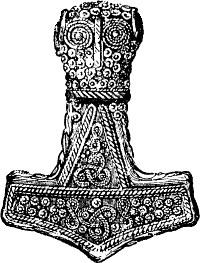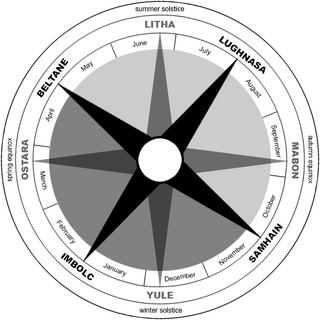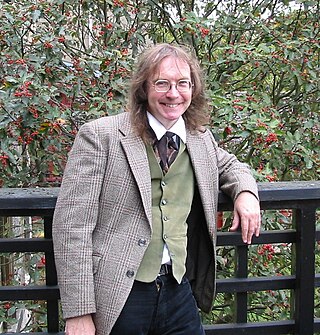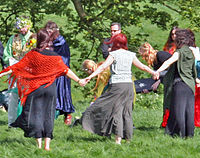
Heathenry is a modern Pagan new religious movement that has been active in the United States since at least the early 1970s. Although the term "Heathenry" is often employed to cover the entire religious movement, different Heathen groups within the United States often prefer the term "Ásatrú" or "Odinism" as self-designations.

Modern paganism, also known as contemporary paganism and neopaganism, spans a range of new religious movements variously influenced by the beliefs of pre-modern peoples across Europe, North Africa, and the Near East. Despite some common similarities, contemporary pagan movements are diverse, sharing no single set of beliefs, practices, or religious texts. Scholars of religion may study the phenomenon as a movement divided into different religions, while others study neopaganism as a decentralized religion with an array of denominations.

Wicca, also known as "The Craft", is a modern pagan, syncretic, earth-centered religion. Considered a new religious movement by scholars of religion, the path evolved from Western esotericism, developed in England during the first half of the 20th century, and was introduced to the public in 1954 by Gerald Gardner, a retired British civil servant. Wicca draws upon ancient pagan and 20th-century hermetic motifs for theological and ritual purposes. Doreen Valiente joined Gardner in the 1950s, further building Wicca's liturgical tradition of beliefs, principles, and practices, disseminated through published books as well as secret written and oral teachings passed along to initiates.

The Wheel of the Year is an annual cycle of seasonal festivals, observed by a range of modern pagans, marking the year's chief solar events and the midpoints between them. Modern pagan observances are based to varying degrees on folk traditions, regardless of the historical practices of world civilizations. British neopagans popularized the Wheel of the Year in the mid-20th century, combining the four solar events marked by many European peoples, with the four midpoint festivals celebrated by Insular Celtic peoples.

Ronald Edmund Hutton is an English historian specialising in early modern Britain, British folklore, pre-Christian religion, and modern paganism. A professor at the University of Bristol, Hutton has written over a dozen books, often appearing on British television and radio. He held a fellowship at Magdalen College, Oxford, and is a Commissioner of English Heritage.

Celtic neopaganism refers to any type of modern paganism or contemporary pagan movements based on the ancient Celtic religion. One approach is Celtic Reconstructionism (CR), which emphasizes historical accuracy in reviving Celtic traditions. CR practitioners rely on historical sources and archaeology for their rituals and beliefs, including offerings to spirits and deities. Language study and preservation are essential, and daily life often incorporates ritual elements. While distinct from eclectic pagan and neopagan witchcraft traditions, there is some overlap with Neo-druidism.

Religion in England is characterised by a variety of beliefs and practices that has historically been dominated by Christianity. Christianity remains the largest religion, though it makes up less than half of the population. As of the 2021 census, there is an increasing variety of beliefs, with irreligious people outnumbering each of the other religions. The Church of England is the nation's established state church, whose supreme governor is the monarch. Other Christian traditions in England include Roman Catholicism, Methodism, Presbyterianism, Mormonism, and the Baptists. After Christianity, the religions with the most adherents are Islam, Hinduism, Sikhism, Judaism, Buddhism, modern paganism, and the Bahá'í Faith. There are also organisations promoting irreligion, including humanism and atheism. According to the 2021 census, Shamanism is the fastest growing religion in England.
Modern paganism in the United States is represented by widely different movements and organizations. The largest modern pagan religious movement is Wicca, followed by Neodruidism. Both of these religions or spiritual paths were introduced during the 1950s and 1960s from Great Britain. Germanic Neopaganism and Kemetism appeared in the US in the early 1970s. Hellenic Neopaganism appeared in the 1990s.
Philip Shallcrass, often known by his Druid name, Greywolf, is Chief of the British Druid Order. He is an English artist, writer, poet, musician and singer-songwriter who pioneered a "shamanic" Druidism.
Many neo-pagan religions such as Wicca, Druidry and Celtic polytheism have active followings in Ireland, although the number of declared adherents is likely quite small. It has been claimed to be the fastest growing religion in Ireland.

"Heathenry" as it is expressed in Canada is used as a universal term to describe a wide range of Germanic Neopaganism. Those who practice the religions or folk-ways of Ásatrú, Forn Sed, Odinism or Theodism are all considered part of a greater Heathen umbrella. In Canada, Heathenry takes a socially liberal standing in its philosophy. The exclusion of adherents on the basis of ethnic origin, sexual orientation, other group affiliation as well as other discriminatory factors is opposed by most Canadian Heathen groups, although there are, as in the United States a small number of racially minded groups that limit their membership to those of "Nordic ancestry".

Druidry, sometimes termed Druidism, is a modern spiritual or religious movement that promotes the cultivation of honorable relationships with the physical landscapes, flora, fauna, and diverse peoples of the world, as well as with nature deities, and spirits of nature and place. Theological beliefs among modern Druids are diverse; however, all modern Druids venerate the divine essence of nature.

The Pagan Religions of the Ancient British Isles: Their Nature and Legacy is a book of religious history and archaeology written by the English historian Ronald Hutton, first published by Blackwell in 1991. It was the first published synthesis of the entirety of pre-Christian religion in the British Isles, dealing with the subject during the Palaeolithic, Neolithic, Bronze Age, Iron Age, Roman occupation and Anglo-Saxon period. It then proceeds to make a brief examination of their influence on folklore and contemporary Paganism.

The Triumph of the Moon: A History of Modern Pagan Witchcraft is a book of religious history by the English historian Ronald Hutton, first published by Oxford University Press in 1999. At the time, Hutton was a Reader in History at Bristol University, and had previously published a study of ancient pre-Christian religion, The Pagan Religions of the Ancient British Isles (1991) as well as studies of British folk customs and the Early Modern period.

A Community of Witches: Contemporary Neo-Paganism and Witchcraft in the United States is a sociological study of the Wiccan and wider Pagan community in the Northeastern United States. It was written by American sociologist Helen A. Berger of the West Chester University of Pennsylvania and first published in 1999 by the University of South Carolina Press. It was released as a part of a series of academic books entitled Studies in Comparative Religion, edited by Frederick M. Denny, a religious studies scholar at the University of Chicago.
Pagan studies is the multidisciplinary academic field devoted to the study of modern paganism, a broad assortment of modern religious movements, which are typically influenced by or claiming to be derived from the various pagan beliefs of premodern Europe. Pagan studies embrace a variety of different scholarly approaches to studying such religions, drawing from history, sociology, anthropology, archaeology, folkloristics, theology and other religious studies.

Modern Paganism in World Cultures: Comparative Perspectives is an academic anthology edited by the American religious studies scholar Michael F. Strmiska which was published by ABC-CLIO in 2005. Containing eight separate papers produced by various scholars working in the field of Pagan studies, the book examines different forms of contemporary Paganism as practiced in Europe and North America. Modern Paganism in World Cultures was published as a part of ABC-CLIO's series of books entitled "Religion in Contemporary Cultures", in which other volumes were dedicated to religious movements like Buddhism and Islam.

Enchanted Feminism: The Reclaiming Witches of San Francisco is an anthropological study of the Reclaiming Wiccan community of San Francisco. It was written by the Scandinavian theologian Jone Salomonsen of the California State University, Northridge and first published in 2002 by the Routledge.
Heathenry in the United Kingdom consists of a variety of modern pagan movements attempting to revive pre-Christian Germanic religiosities, such as that practised in the British Isles by Anglo-Saxon and Nordic peoples prior to Christianisation.















